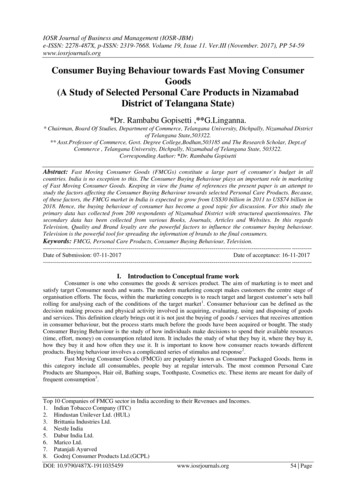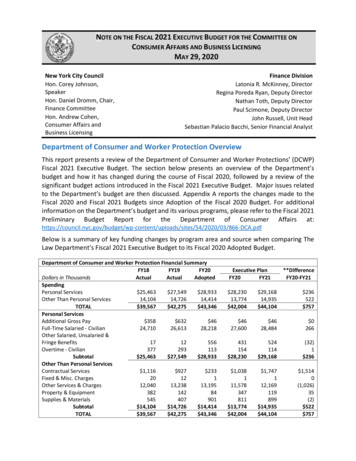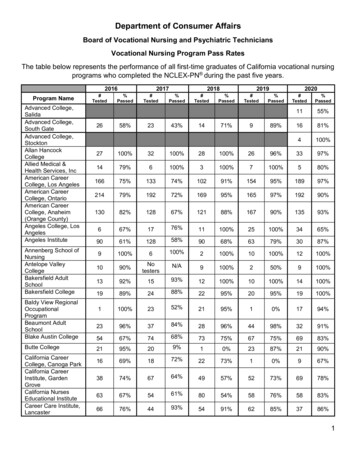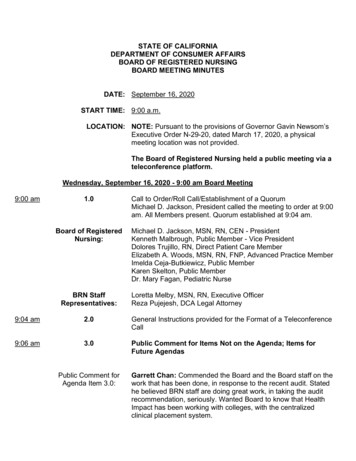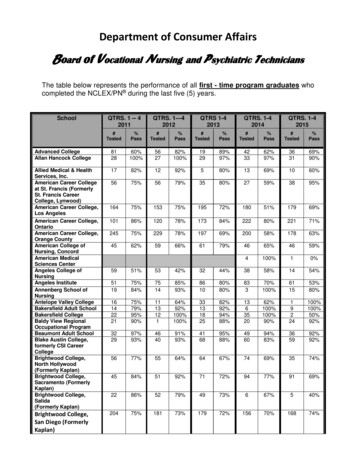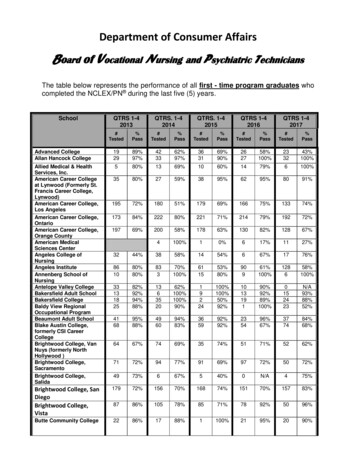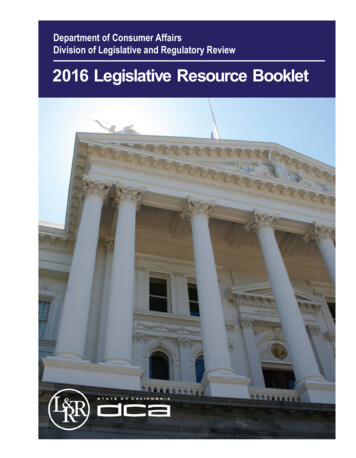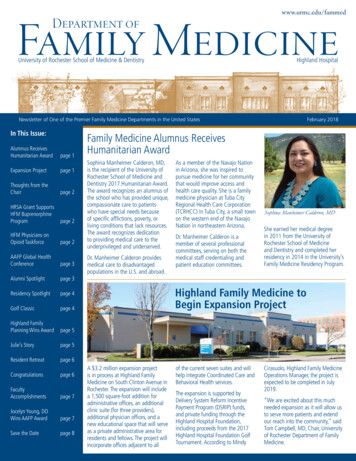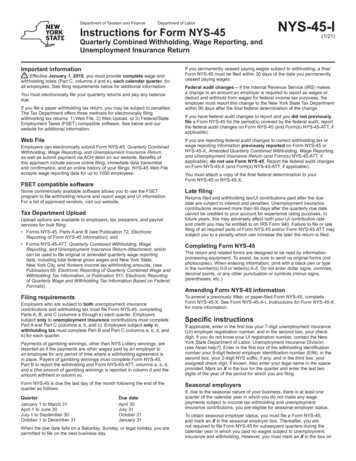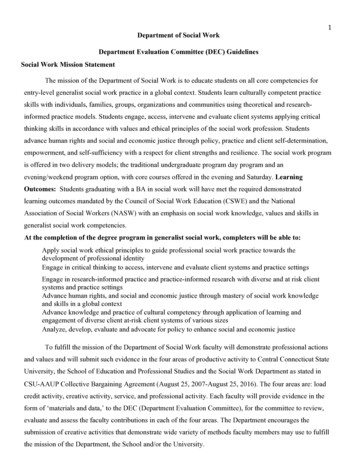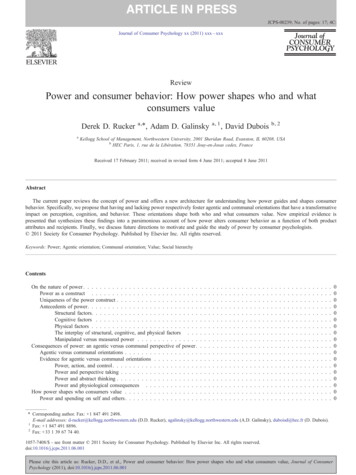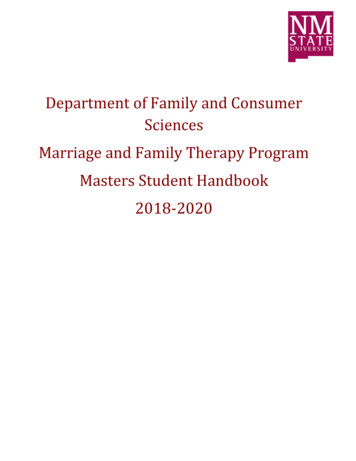
Transcription
Department of Family and ConsumerSciencesMarriage and Family Therapy ProgramMasters Student Handbook2018-2020
Introduction:Mission and Educational OutcomesMission StatementsDepartment of Family & Consumer Sciences Mission StatementWe are committed to providing our students with excellent educational experiences that willprepare them to enter the workforce, further their education, and/or engage in community serviceupon graduation. We have a dynamic, intellectual faculty and student body working towardimproving the quality of individual and family life for all New Mexicans.Marriage and Family Therapy ProgramThe mission of the Masters of Science (MS) program in Marriage and Family Therapy (MFT) isto train students to provide quality clinical services in the field of marriage and family therapy.Students are prepared to work with individuals across the lifespan through individual, couple,family, and group modalities. Specific to this mission, the MFT masters program works toeducate culturally competent and social justice-minded MFT clinicians prepared to meet theneeds of diverse populations in New Mexico and nationally.MFT Program OutcomesThe MFT Masters program is designed around an outcomes-based educational philosophy. Inaddition to Student Learning Outcomes, there are expected outcomes for the program as a wholeand for faculty members. All coursework and program experiences are intended to foster studentdevelopment in each of the following outcomes:1. MFT Theories2. Diagnosis & Treatment Planning3. Ethical & Legal Issues4. Business Practices of MFT5. Licensure as an MFTMFT Student Learning Outcomes1. Students will gain a professional understanding of MFT theories.2. Students will be able to diagnose disorders with precision and accuracy.3. Students will be able to identify and apply techniques that are appropriate to clientdiagnosis.4. Students will recognize the importance of engaging in ethical practice.5. Students will understand the business side of being an LMFT.
Chapter 1Program Policies and University ResourcesThe Marriage and Family Therapy Program is housed within the Department of Family &Consumer Sciences. The Department is responsible for providing the coursework, advising, andday-to-day services needed for MFT students. However, all graduate programs at NMSU fallunder the supervision of the Dean of the Graduate School. Paperwork required for graduatedegrees will be generated within the Department but processed by the Graduate School.Correspondence from the MFT ProgramIntermittent correspondence is necessary to keep students informed of changes inacademic/departmental policies and procedures, as well as other information pertinent tostudents. Students are required to use a university email account (nmsu.edu) and to check itregularly in order to remain informed of MFT Program, Department and University news andactivities. Correspondence from the MFT Program and MFT faculty will be addressed tostudents at their NMSU email address only.Student Membership in Professional OrganizationsAll students within the MFT Program are expected to become actively involved in MFT and/orfamily social science professional organization(s). MFT students are required to join andmaintain their student membership in the American Association for Marriage and FamilyTherapy (AAMFT), an organization that advocates for special interests of MFTs in the US andCanada. Student members of AAMFT also receive free professional liability insurance as amembership benefit. As a member of AAMFT, students are also members of the New MexicoAssociation of Marriage and Family Therapists (NMAMFT). Students will receive ongoinginformation from program faculty regarding AAMFT and NMAMFT events and opportunities.Students are strongly encouraged to attend AAMFT annual local and national conferences andtraining opportunities.Graduate AssistantshipsA limited number of Masters level graduate assistantships are offered each academic yearbeginning in August and ending in May. Students must have full-time status during this time.The amount of the stipend is determined annually. Responsibilities include research, teachingassistance, and/or other departmental activities. Total workload may not exceed 20 hours perweek. All appointments carry the possibility of renewal. Individuals interested in assistantshippositions should communicate their interest to the MFT Clinical Director as early as possibleprior to each academic year in order to be considered for positions.Academic Review and Retention PolicyThe MFT Program Faculty will meet periodically to discuss the progress of students in theprogram. The following elements will be reviewed: academic progress and promise; therapyskills acquisition and development; personal issues that may be interfering with progress in theprogram; and legal and ethical issues. In the event that there is faculty concern about a studentregarding any of these areas, the student’s faculty advisor and/or the clinical director will meetwith the student to discuss necessary remediation and steps to take toward improvement or tooffer assistance to the student in finding a more suitable field of study.
During internship, regular evaluations are made by faculty to determine whether the student isprepared to proceed to internship, whether the internship needs to be repeated, or if otherassistance is necessary to continue in the program. Reasons for not progressing to or throughinternship include:1. Failing a prerequisite class2. Not following ethical or legal guidelines during internship3. Not meeting core competencies in internshipA student may be considered for dismissal from the program for any of the following reasons:1. Failing internship class2. Being fired from an internship3. Plagiarism and/or cheating on assignments or exams4. Breaking confidentiality of fellow cohort members or clients5. Failing the comprehensive exam6. Violating the student code of conductStudent HandbookIn addition to the policies and procedures outlines in this document, students are responsible forknowing, and complying with, all policies and procedures as outlined in the NMSU StudentHandbook .Students with DisabilitiesSection 504 of the Rehabilitation Act of 1973 and the Americans with Disabilities Act (ADA)covers issues relating to disability and accommodations. If a student has questions or needs anaccommodation in the classroom (all medical information is treated confidentially), contact:Trudy LukenStudent Accessibility Services (SAS) - Corbett Center, Rm. 244Phone: 646.6840 E-mail: sas@nmsu.eduWebsite: www.nmsu.edu/ ssd/Discrimination PoliciesNMSU policy prohibits discrimination on the basis of age, ancestry, color, disability, genderidentity, genetic information, national origin, race, religion, retaliation, serious medicalcondition, sex, sexual orientation, spousal affiliation and protected veterans status. Furthermore,Title IX prohibits sex discrimination to include sexual misconduct, sexual violence, sexualharassment and retaliation.For more information on discrimination issues, Title IX or NMSU's complaint processcontact:Gerard Nevarez or Agustin DiazOffice of Institutional Equity (OIE) - O'Loughlin HousePhone: 646.3635 E-mail: equity@nmsu.eduWebsite: http://www.nmsu.edu/ eeo/
PlagiarismPlagiarism is using another person's work without acknowledgment, making it appear to be one'sown. Intentional and unintentional instances of plagiarism are considered instances of academicmisconduct and are subject to disciplinary action such as failure on the assignment, failure of thecourse or dismissal from the university. The NMSU Library has more information and help onhow to avoid plagiarism at http://lib.nmsu.edu/plagiarism/
Chapter 2Progression Through the ProgramStudents must complete the following steps in order to successfully complete the Marriage andFamily Therapy Master’s Program. Most forms referenced are available at grads.nmsu.edu ormft.nmsu.edu.1. Apply to the MFT Masters of Science ProgramMarriage and Family Therapy-DEADLINE: February 1You will need to turn in several items to have a complete application packet. Theyare:1 Undergraduate transcripts2 GRE Scores3 Statement of Purpose4 Letters of Recommendation5 Curriculum VitaIn addition to these items, you will need to apply for graduate status at the University level.2. Acceptance into the MFT ProgramThe rating of applications is an objective process. The following scoring system is used torank applicants.The range of scores is from 7 (worst) – 35 (best).Letter 00 Truly OutstandingTrulyOutstandingTruly r33.3-3.49500-570Above averageAbove averageAbove average23.0-3.29450-499AverageAverageAverage1 2.99 450Below AverageBelow AverageBelow AverageGPA and GRE scores are weighted by 2. Example: If your GRE score is 505, then your score is3*2 6.Reference letters are given an individual score and then the average score is used to assign afinal score.Applicants with the top scores will be invited to participate in an interview with the MFTfaculty. After the interviews are completed, the top candidates will be accepted to the
program. Two alternate applicants will be placed on a waiting list for that year only. If anindividual who is admitted chooses not to attend, the next applicant on the waiting list willbe given an opportunity to enroll.3. Enroll at NMSUSuccessful applicants will be notified via email of their acceptance into the program. They willhave two weeks to confirm or decline their acceptance. Once they have done so, the GraduateSchool will be notified so that they can begin the process of registering.Register for a personal PIN and computer account number. Click on the “ACTIVATE”button. This is important to be able to use the University Online system to register for classes,check about financial aid etc.Get a parking permit. You will need a parking permit to park in various lots oncampus.Take care of Financial Aid. Make sure you have your financial aid information turned into the financial aid office.4. Meet with your advisorWhen you are accepted to the program, you are assigned an advisor. Your advisor will helpyou to choose courses to enroll in during your first year. You will have many interactions withyour graduate advisor as this person will engage in a mentoring relationship with you. Agraduate advisor plays a large role in a graduate student’s development. Make sure you meetwith this person as soon as possible after you are accepted. He or she is one of the mostvaluable resources you have for information, guidance, and advice.You should schedule a formal meeting with your advisor within a month of being accepted tothe program. During this meeting, you should (1) discuss courses you should take in your firstyear, (2) talk about who will be on your graduate committee, and (3) begin to discuss careerplans and ideas.5. Register for CoursesYou and your advisor will determine the courses you need to enroll in the first semester ofstudy at NMSU. Once you discuss this with your advisor, you should register as soon aspossible to ensure that classes do not close prior to your enrolling.
6. Develop your Advisory CommitteeThe Graduate Students (thesis or non thesis) will work with his/her Major Professor tocompose an Advisory Committee prior to the completion of 12 credit hours of graduate work.The Advisory Committee will consist of a minimum of 4 graduate faculty members: MajorProfessor, the other two faculty members from within the Department of Family and ConsumerSciences. A third member, from outside the Department of Family and Consumer Sciences,will be designated by the Graduate School. A suggestion for this person may be proposed bythe Graduate Student and Major Professor. Note: If a student has a designated minor, onefaculty member must be from that subject matter area.7. Develop a plan of studyA plan of study is simply a list of the classes you need to take and the anticipated times atwhich you will take them. MFT students need to keep two things in mind when developing aplan of study. 1. New Mexico state licensing requirements. If you plan on moving to anotherstate after graduation, please find the requirements for licensure in that state. 2. NMSUrequirements for the degree. The academic and licensing requirements will overlap.8. Comprehensive ExaminationsAt the end of a student’s program of study (typically in the Spring of their second year), everystudent in the MFT program will be required to complete a comprehensive written and oralexam. The written exam will involve in-depth analysis of a case study written by the MFTfaculty that addresses concepts from each of the courses completed during the program (seechapter 4). For the oral portion of the exam, each student will present their portfolio to theircommittee (two MFT faculty members and one representative from an outside department). TheMFT faculty will provide detailed instructions to help students prepare their presentation.In the case of a student who is completing coursework for licensure but is not a degree-seekingstudent, they will be required to enroll in one credit hour of FCS 590 under their faculty advisorand to complete the written and oral exams.
Chapter 3Academic Requirements for MFT ProgramThe MFT Masters program is a 45 credit hour program of study, which includes an intensive 12month practicum consisting of a minimum of 300 client contact hours. Marriage and familytherapists are employed in a wide variety of settings including social service agencies, medicalfacilities, private family therapy practice, churches, and schools. The MFT Master’s program atNew Mexico State University is focused on developing students’ skills for direct clinical workwith individuals, couples, and families in a variety of settings.The MFT Masters program emphasizes a competency-based educational philosophy, with thegoal of enhancing student development toward demonstration of clinical competency andultimately obtaining the designation of Licensed Marriage and Family Therapist. The MFTprogram at NMSU aligns with the core competencies as outlined by the American Association ofMarriage and Family Therapy (AAMFT). Hence, within each course in the MFT program,students will be expected to demonstrate attainment of specific competencies and course gradeswill be reflective of such competence. The internship experience then becomes the mechanismwherein students are able to put into practice the theory and skills that have been learned underthe close supervision of faculty.Program of StudyThe following outlines the courses required for the MFT program. Students are admitted into theprogram during the Spring semester and begin course work in the Summer session. Studentswho choose to enter the program on a part-time basis or those students with other uniquescheduling needs should schedule a meeting with the MFT Program Director as early as possibleupon entering the program in order to determine the best degree plan design to meet studentneeds and program requirements. The following is a general outline of courses to be taken,subject to change without prior notice due to resource availability.YearSemesterCourseOneSummerFCS XXX Development CourseFCS 584 Family Law and Ethics (online/in person hybrid)FallFCS 572FCS 582FCS 592FCS 585FCS 586SpringFCS 587 Contemporary Marriage and Family Issues (Even Years)FCS 589 Family Crisis and Rehabilitation (Odd Years)FCS 582 Theories of MFTFCS 592 Strategies of MFTEDUC 519 Edumetrics or other approved stats courseFamily Dysfunction and DiagnosisTheories of MFTStrategies of MFTThe Family System (Even Years)Sexuality & Family Dynamics (Odd Years)
TwoSummerFCS XXX Development CourseFCS 525 Supervised Clinical PracticeFallFCS 586 Sexuality and Family Dynamics (Odd Years)FCS 585 The Family System (Even Years)FCS 500 Research Methods or approved research methods courseFCS 525 Supervised Clinical PracticeSpringFCS 525 Supervised Clinical PracticeFCS 549 Family Ethnicities & Subcultures or other approvedMulticultural course(Odd Years)FCS 583 Parenting and Child Guidance (Even Years)FCS 587 Contemporary Marriage and Family Issues (Even Years)FCS 589 Family Crisis and Rehabilitation (Odd Years)
Chapter 4Completion of MFT Theory and Practice PortfoliosPurpose of PortfoliosMFT Theory Portfolios serve four primary functions:1. Demonstration of students’ minimal competence at two milestones (candidacy andcomprehensive review) within program,2. Opportunities (at candidacy and comprehensive review) for formative feedback tofacilitate students’ attainment of student learning outcomes,3. Summative evaluation of students’ competence at comprehensive review,4. Formative feedback to program faculty and instructors for program development andevolution as themes and patterns of student learning are observed over time.Comprehensive Portfolio Review & PresentationSatisfactory evaluation of the Comprehensive Review Portfolio and Presentation will result instudents’ approval by the MFT Program Faculty for graduation, upon completion of requiredclinical contact hours and fulfillment of clinical requirements. The Comprehensive review, incombination with the internship process, serves as a summative evaluation of student’sdemonstration of clinical competence and all Student Learning Outcomes (See Table 5 forlinkage of outcomes to portfolio contents). Further, students will receive formative feedbackfrom faculty to facilitate their postgraduate professional development and progress towardlicensure. Each of the required products will be submitted electronically for Committee Review(detailed instructions provided at Portfolio Orientation meeting). Once the document has beenapproved by the student’s committee chair, they will schedule a 2-hour presentation.The required products for the MFT Theory and Practice Portfolio at Comprehensive Review are:1. Clinical Video Demonstration and Position Paper (see below for details)2. Internship Summary Report Form containing summary of direct client contact andsupervision completed to date.3. Supervisor-Report Competency Evaluation Forms from FCS 525.4. Documentation of Current AAMFT Student Membership.Table 5: Portfolio Documents at Comprehensive Review and Corresponding Student LearningOutcomesPortfolio ProductsStudent Learning Outcomes DemonstratedClinical Video Demonstration and PositionPaperOutcomes 1-9Internship Summary Report FormOutcomes 1-9 (through completion of requiredclient contact and supervision hours)
Supervisor-Report and Self- Report CEIsOutcomes 2,3,5,6,7,8, and 9Documentation of AAMFT StudentMembershipOutcome 10Clinical Video Demonstration and Position PaperThe Clinical Video Demonstration and Position Paper is an opportunity for students to describeand demonstrate their personal approaches to clinical practice. The paper should be no more than20 pages and written in accordance with current APA Publication Manual standards (currently6th edition). The paper should clearly describe, in a broad manner, how the student approachestherapy, and specifically what this looks like with two selected clients. A video demonstrationshould then complement the written descriptions of the students’ approach to therapy. In thePosition Paper, student should specifically speak to the following points in order to demonstratethe outcomes evaluated at Comprehensive Review: Discuss in depth the model(s) of therapy they are following in their clinical work,recognizing the historical context of the model(s) within the MFT field, Articulate the theory of change that underlies their clinical work, consistent with themodel(s) they report following, and how their role as a therapist is shaped by thistheoretical foundation, Describe how the therapist’s clients’ racial, cultural, and socioeconomic contexts areconceptualized
mft.nmsu.edu. rank applicants. 1 3*2 6 Chapter 2 Progression Through the Program Students must complete the following steps in order to successfully complete the Marriage and Family Therapy Master’s Program. Most forms referenced are available at grads.nmsu.edu or . 1. App
